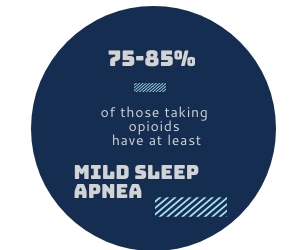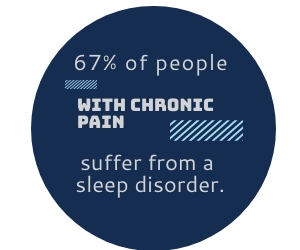Discovering the Dangers of Opioids and Sleep Apnea
Read the first part of our two-part series uncovering the link between opioids and sleep disorders.
The current opioid crisis is well documented. And the battle being waged to decrease the number of people addicted to, misusing, and overdosing from opioid medications is massive. Law enforcement, healthcare providers, the FDA and CDC, addiction and pain management specialists are working together to raise awareness and curb the problem.
To help decrease the availability of and unnecessary exposure to the powerful pain pills, many doctors are recommending other solutions for pain relief. Opioid prescriptions from physicians have decreased more than 50% since 2012, according to recent studies. For the first time in nearly two decades, alternative treatments, drug-free solutions, and natural therapies are finally on the rise. This trend is partially fueled by new information that is coming out about the risks associated with opioid use.
Recent research is showing an alarming connection between long-term opioid use and an increased risk of respiratory depression during sleep. Along with dangerous side effects – including disrupted sleep and insomnia – opioids are also putting people at higher risk for respiratory depression and sleep-related breathing disorders, namely central sleep apnea and obstructive sleep apnea. So, what does this mean for patients?
Opioids & Sleep Disordered Breathing
These powerful painkillers and sleep do not mix well. All types of drugs in this category – like morphine, oxycodone, codeine sulfate, fentanyl, and hydrocodone – tend to decrease both REM and slow-wave sleep. Now, scientists are discovering that they also can cause irregular breathing during sleep.
The numbers show that a staggering 75-85% of those taking opioids regularly have at least mild sleep apnea, and about 40% have severe sleep apnea. This refers to complex sleep apnea, which presents symptoms and characteristics of both central and obstructive sleep apnea.
Although research has not yet made it clear how the drugs cause sleep-disordered breathing, it is likely due to a depressant effect on the central nervous and respiratory systems. Plus, taking opioids often results in drowsiness and muscle relaxation, which can also lead to issues generally associated with OSA.
Studies have found that patients, taking opioids as prescribed for pain are at higher risk for adverse respiratory effects and irregular central apneas in certain stages of the sleep cycle. They have also noted a correlation between higher daily doses of the pain medication and an increased frequency of central apneas. In other terms, patients taking more opioids tend to have more severe sleep apnea.
What’s at Stake?
Sleep apnea, as a side effect of long-term opioid use, is serious and potentially fatal. We think two local pulmonologists in Ohio summed up this very scary risk best in their recently published article:
“Many individuals on opioids are found dead in bed, without any apparent cause. It is suspected that a terminal apnea could be a potential cause of death. It is our hope that by limiting the use of opioids, sleep-disordered breathing can be eliminated and death may be prevented in these young individuals.” – Journal of Clinical Sleep Medicine
Treatment Options for Opioid-Induced Sleep Apnea
Doctors and clinicians are currently working to understand what the best treatment options are for opioid-associated sleep apnea, between CPAP therapy and other options. Some studies have shown opioid-induced sleep apnea to be particularly resistant to CPAP therapy. Also, because CPAP therapy does not always successfully treat central sleep apnea, other treatments, such as adaptive servo-ventilation (ASV) may be recommended.
The Search for Solutions in the Opioid Crisis
The research that has been done up to this point has revealed some important information. But there is still a lot of work to be done. In the fight against opioids, we underline the need to make progress in three main areas.
Better Treatment Options for Chronic Pain
Sleep problems are common for those managing long-term pain or dealing with conditions such as fibromyalgia and cancer. In fact, pain is often a trigger for insomnia; about two-thirds of people with chronic pain also have a sleep disorder.
In addition to the dangerous effects that sleep apnea has on the heart, brain, and general health of patients if untreated, there is also some reason to believe that disrupted sleep makes pain worse. This would indicate a negative cyclical effect between pain symptoms, medicating, poor sleep, and increased pain. It is easy to see how this spiral could lead to over-medicating, drug dependence, and substance abuse.
Wider Use of Testing for Sleep Disorders
The rapid increase in the use of these powerful drugs has been a major concern of sleep specialists, knowing that many patients have undiagnosed sleep disorders that could be aggravated by the drug. Medical professionals caring for patients undergoing opioid therapy, must be aware of the symptoms of sleep-disordered breathing. These include disrupted sleep, loud snoring, and excessive daytime sleepiness.
To prevent the damaging effects of sleep apnea, it is necessary to screen people for sleep disorders before beginning a regimen of prescription opioids. Going forward, sleep clinicians and doctors should work together to ensure that any disordered breathing that develops is quickly and effectively treated. Regular screening can determine when CPAP therapy or other treatment options should be introduced to keep the patient healthy.
Caution When Prescribing Medication
Healthcare providers at every level are actively working to decrease the number of prescriptions given for opioid medication and the dosage amounts recommended. The American Academy of Sleep Medicine has advocated against giving opioids for long-term pain due to the potentially dangerous effect of respiratory depression. As healthcare professionals, we should favor drug-free therapies whenever appropriate and continue to use caution when prescribing medications.
Get more information about effective, drug-free treatments options for Insomnia, alternative treatments for Obstructive Sleep Apnea and Central Sleep Apnea.
Reliable Sleep Testing Services
Quality sleep is an important part of your overall health and a proper diagnosis is crucial to safe medical care. Sleep Health Solutions in Cuyahoga Falls, Ohio provides a full range of clinical and at-home sleep testing. Contact us today to schedule a consultation.



